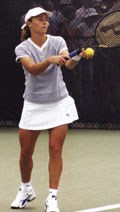Few students can simultaneously attend their college graduation and their tenth class reunion. And it’s a rare undergraduate who has a long career as a professional athlete behind her. But Erika deLone ’95 (’05) can claim both distinctions. After 11 years on the Women’s Tennis Association (WTA) professional tennis tour, deLone returned to Cambridge in the fall of 2002 as a sophomore, and is now a 32-year-old senior who, this June, will graduate with a degree in economics.
In the fall of 1991, deLone was one of the best women tennis players ever to show up at Harvard. She had a spectacular freshman year, not only playing at number one for the Harvard varsity, but ending the season ranked sixth in the nation after ranking as high as number two. A 1992 all-American, she reached the quarterfinals of the NCAA individual tournament. At the National Indoor Championships, she lost in the finals to the University of Florida’s Lisa Raymond, currently one of the top 50 professionals.
 |
| Erika deLone at home, with a doubles trophy from her pro tennis career. |
| Photograph by Stu Rosner |
“I loved my freshman year,” deLone says. “It was better than I would have ever imagined.” She had five roommates and enjoyed her courses. Even so, “My tennis suffered a little,” she says. After high school, she took a year off to play professional tournaments (declining prize money, to preserve her amateur eligibility) and rose as high as 95th on the WTA computer. But in her freshman year at Harvard, she played only two pro events and saw her ranking drop to 250th. “It’s inevitable, when you are focusing on academics and so many other things,” she explains. “But I had a dream I wanted to fulfill with tennis.”
 |
| DeLone prepares to serve at the U.S. Open. |
| Courtesy of Erika deLone |
So deLone took a leave of absence and joined the women’s tour. Many fellow players, in fact, “thought I was crazy to come to Harvard in the first place,” she says, because four years of college might keep her from playing the game at its highest levels during her athletic prime. (Another tennis prodigy, James Blake ’01, dropped out after his sophomore year to play the pro circuit; he is still active on the tour and has risen as high as 22nd in the world rankings.) A hard-hitting, aggressive baseliner whose favorite shot is her two-handed backhand, deLone’s quickness and tenacity, plus her strong serve, gave opponents lots of trouble.
The uprooted life of constant traveling, without teammates, can make the tennis professional’s lot a lonely one; personal relationships are difficult to pursue. In deLone’s case it helped to have an older sister who was already in the pros. Amy deLone ’91 was a top Harvard player who graduated and turned professional just before kid sister Erika arrived in Cambridge. “We’re very close,” Erika says. “We’ve been best friends all our lives.”
The sisters hail from Lincoln, Massachusetts; Amy went to Concord Academy but Erika chose Lincoln-Sudbury High School because the public school was more flexible about missing days to play national tournaments. Both girls worked with Bill Drake, a well-known tennis coach at The Country Club in Brookline, Massachusetts, and Erika spent one high-school year at the Nick Bollettieri Tennis Academy in Bradenton, Florida. “Amy started [tennis] slightly before me,” Erika says. “I wanted to do everything she was doingand get good enough to beat her. She was probably the more talented of the two of us; her strokes were effortless. I had to work a lot harder but I was a lot more driven, from being the youngest.” In the pros, Amy eventually ranked around 400 in singles and 100 in doubles; the two deLones played on the tour together for four years and, at the U.S. Open, once won an all-siblings doubles match over the Bulgarian Maleeva sisters.
Erika deLone had a long pro career, winning nine singles titles and 10 doubles championships in “Challenger”-level events. In 1999 she achieved her highest singles ranking (65th), and at a tournament in Kuala Lumpur, beat the Australian Alicia Molik, currently ranked in the top 10. In 1995, deLone played Monica Seles in the second round of the U.S. Open, right after Seles returned to the tour after having been stabbed in Germany two years earlier. DeLone’s deepest penetration into a Grand Slam draw was the doubles quarterfinals of the Australian Open. “I’ve definitely seen almost every corner of the world,” she saysfrom Melbourne and Paris to less magnetic venues like Uzbekistan. There, “We [players] had a cinder-block hotel, with somebody spying on us on every floor, and we got sick from the food,” she recalls. “When we left, at the airport they tried to charge us $800 in excess baggage fees.”
DeLone’s travels have now come full circle to Cambridge. As an older undergraduate, she lives off campus and has limited her Harvard athletics to rowing on the Dudley House intramural crew, which includes some graduate students. Occasionally, she will hit a few tennis balls with members of the Harvard women’s varsity, and she’s learning golf. Tennis has figured in her academic life: deLone did a case study on the WTA with Kirstein professor of human relations Jay Lorsch of the Business School. The hardest adjustment, she says, is that she misses “the competitionthe thrill of winning a match or tournament.”
Yet deLone stays connected to the pro game as a player representative on the WTA board. (“Players don’t have time to go to board meetings,” she explains.) It’s a board that meets in some pretty nice placesParis during the French Open, London during Wimbledon. This January, deLone went to Melbourne for a WTA Players’ Council meeting. “Unfortunately,” she says, “I had to come back early, for exams.”
~Craig Lambert





